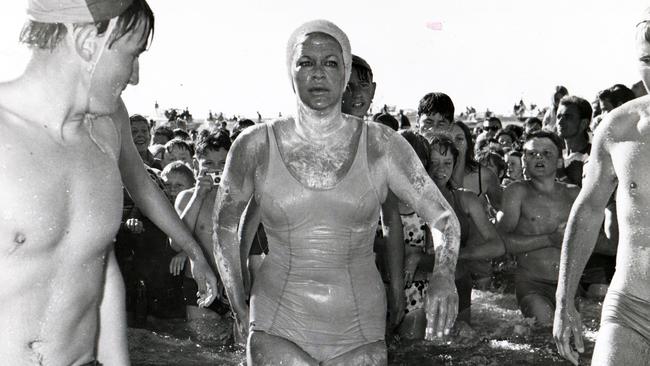Linda McGill shrugged off Olympic travesty to claim English Channel first
“She’ll be right, sport,” was the parting shout of banned Australian Olympic swimmer Linda McGill 50 years ago, as she set out to become the first Australian to swim the Channel on August 7, 1965

Today in History
Don't miss out on the headlines from Today in History. Followed categories will be added to My News.
‘Please help me, God,” Gertrude Ederle, the first woman to swim the English Channel, prayed as she entered the water off France on August 6, 1926.
“She’ll be right, sport,” was the parting shout of banned Australian Olympic swimmer Linda McGill 50 years ago, as she set out to become the first Australian to swim the Channel on August 7, 1965.
At 19, McGill had hoped to break Danish-American Greta Andersen’s women’s record of 11 hours one minute for the 32km France-England crossing, set on August 23, 1958. Confronted with choppy waves and a sea temperature of 13C at Cap Gris Nez on the French coast, McGill lowered her expectations, saying she would be happy just to complete the distance.
Channel Swimming Association observer Peter Frayne, involved with Channel attempts for 18 years, was not confident of her chances.
“There’s too much wind,” Frayne said. “Wind more than anything else upsets the swimmers. It makes relaxing swimming so much more difficult.”
McGill had also to overcome the psychological devastation of a four-year Australian Swimming Union competition ban, punishment for attempting to join the 1964 Tokyo Olympic opening ceremony.
Born on December 17, 1945, McGill grew up at Abbotsford, on Hen and Chicken Bay. “She used to swim there as a kid,” her father Malcolm explained the day after McGill’s Channel swim. “I helped her train four hours a day since she was 10 years old.”
“It means I am finished,” McGill added. “A swimmer can’t return after four years out of the water.”
McGill decided to tour Britain and Europe with fellow Australian Olympic swimmers Ruth Everuss and Ilsa Konrads. Until then, she had given no thought to swimming the Channel. “I had no idea at all about Channel swimming until I decided to leave Australia after being banned,” she said. “It was only when I reached London that such a swim was suggested. To be honest, I had never even heard of Channel swimming.”
Englishman Matthew Webb was the first person to swim the Channel, crossing in 21 hours 45 minutes in 1875. Sydney’s “million-dollar mermaid”, swimmer and silent film star Annette Kellerman, attempted her first of three Channel attempts in July 1905.
Nauseous from gulping seawater and Cadbury’s
cocoa supplied by her sponsor, Kellerman surrendered after almost 11 hours, commenting: “ ... none of my sex will ever accomplish that particular stunt.”
American Olympic gold medallist Ederle proved her wrong, reaching England in 14 hours and
31 minutes.
McGill was remembered as a friendly, tall, blonde, blue-eyed London City barmaid with a daunting “Junoesque” build before her Channel swim. She left Dover in a launch with Konrads, Everuss, Frayne and German swimmer Martin Neukirchen on the morning of August 6.
French schoolchildren thronged around as she stepped into the water, coated in lanolin, at 4pm. Diarrhoea and sickness started 3km offshore. Her team administered hot kangaroo-tail soup from a pole which she could not touch for fear of disqualification. At one point McGill began to drink seawater, and recalled it tasted “marvellous”. Six hours from Dover, Konrads dived from the escort boat to keep McGill company, but quit with seasickness after an hour.
“I can’t believe it,” McGill gasped, managing a smile when she was helped ashore at Dover at 2.45am on August 7.
In 1967 she swam the Channel twice, once topless, to set a women’s record of 9 hours 59 minutes on September 29.
Ban sent swimmers right to the bottom
IN March 1965 McGill was one of four swimmers hit with the ASU ban, ridiculed as a “laughing stock” around the world.
The ban destroyed the Olympic prospects of Dawn Fraser, 27, banned for 10 years after winning her third 100m freestyle in a row; 200m breaststroke and medley swimmer McGill; 400m freestyler Nanette Duncan, 17, and 400m freestyle champion Marlene Dayman, 15, banned for three years.
“I was in Tokyo ... and never heard a word about misbehaviour. It took ... a lot of money and sacrifices to get Linda to the top. Now these officials have torn it all away in five minutes,” said her father Burwood police sergeant Malcolm McGill.
Originally published as Linda McGill shrugged off Olympic travesty to claim English Channel first


